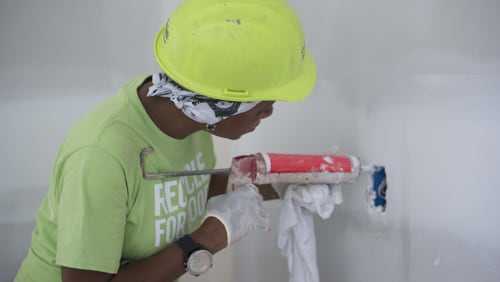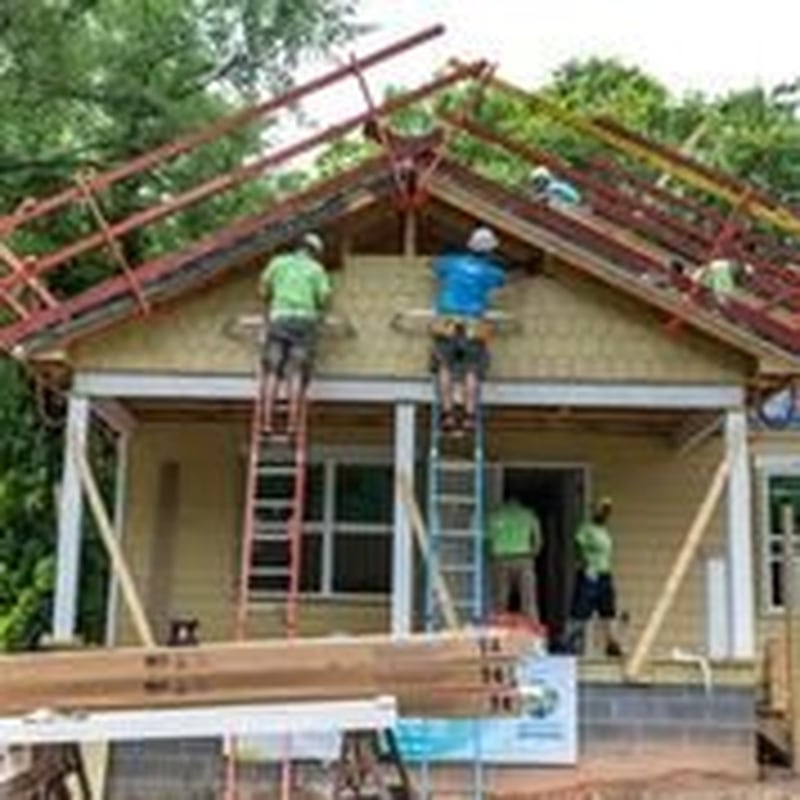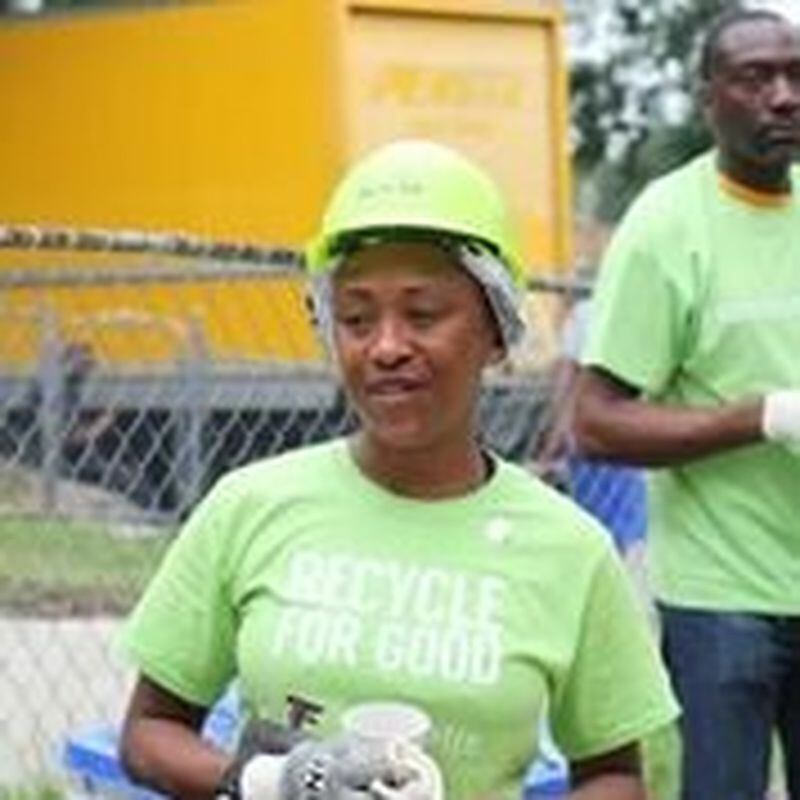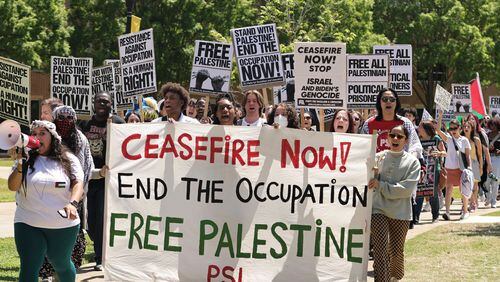Rashawn Medley sits on the steps of her new home, imagining the moment her empty driveway will be filled with relatives arriving for, well, no particular reason. Family doesn’t need a reason to visit.
It’ll be a heady moment for the 35-year-old single mother of two.
For four years they’ve shared a one-bedroom apartment always in need of repair. Her daughters shared the bedroom while she slept on the sofa.
In just two short weeks, that’ll all change. They each will have their own bedroom and two full baths to choose from in a four-bedroom house Medley helped build with her own hands.
It would not have happened, she said, had it not been for the generosity of Habitat for Humanity, The Arthur M. Blank Family Foundation, Novelis, and a host of other community partners.
The green woodframe house sits in the 700 block of Pelham street, a stone’s through from Mattie Freeland Park in the heart of English Avenue in Atlanta’s Westside.
We know the role Habitat has played in the lives of low-income families like the Medleys. More than a million people live in the homes in more than 100 countries built using donated money and material, and voluntary labor, then sold without profit and buyers pay no interest.
We also know that The Arthur M. Blank Foundation committed $15 million to revitalize this and other neighborhoods adjacent to the new Mercedes-Benz Stadium.
What you may not have heard, however, is that last year, Novelis, the world’s largest recycler of aluminum, joined the foundation and its partners to create Recycle for Good, an initiative to encourage Falcons fans and the greater community to recycle.
Medley’s home is the first that Novelis hopes to help build on the Westside over the next few years using the proceeds from the sale of aluminum cans collected at Atlanta Falcons and Atlanta United games. Every three million cans and bottles collected is the equivalent of $80,000, the cost of Medley’s home.
“Georgians send more than $70 million worth of aluminum into landfills every year,” said Ashley Gravlee, manager of corporate social responsibility at Novelis. “Because aluminum can be recycled forever, without losing its properties, it’s the perfect sustainable funding source for communities and non-profits like Habitat for Humanity.”
She said joining the Falcons as its official recycling partner gives Novelis a tremendous platform to educate the “community on the staggering monetary value we are literally burying in the ground when” it could be used to help fund initiatives, spur job creation and deliver environmental benefits.
“What if by 2019, when Atlanta hosts the Super Bowl, multiple families have realized the dream of homeownership all because of what sports fans and this city have recycled?”
Habitat owns about 20 lots in the English Avenue and Vine City communities.
Providing affordable and quality housing is a priority focus for the Blank Foundation and its partners, said Suganthi Simon, Westside Program Officer for the Blank Foundation. In addition, collaborative efforts are underway to continue to provide job training and jobs, improve residents’ physical health, financial well-being and Westside schools and access to early education.
But let me be clear. Westside residents aren’t just waiting for others to do it for them. They are busy implementing their own vision for this community, including renovating Mattie Freeland’s home for use as a community home, where community meetings are held, computer literacy and after school programs are offered.
The center opened in the spring.
In short, they are working to change the narrative about what people think of the Westside.
“There’s such a rich history of cultural and social activism history here,” Simon said. “It’s not all negative.”
Medley, who moved to Atlanta from Washington, D.C. in 1999 after graduating from high school, can attest to that.
Long before her home was finished, she and her daughters, age 12 and 7, walked the neighborhood to imagine what their lives could be.
Back then this part of Pelham was just a vacant lot. Medley would park her white Ford on the street and tell her daughters about their future home while they snacked on sandwiches.
“They would say ‘OK, where’s it at now’,” Medley recalled. “‘How is it gonna get here?’”
She understood because sometimes it all seemed just a dream to her, too.
It had taken her what seemed like a lifetime to get her life together. For so long drugs and alcohol had ruled. It didn’t even matter that she was a mom. Life was a party.
“When Charlie came along, I realized I had no other choice but to get my life together,” Medley said.
That was in October 2009. By then her older daughter Sidney was 5.
Medley found a job at Kroger and then MARTA, where she still works. When she learned a co-worker was getting a Habitat home, she thought maybe.
“I took the kids and went to an information session,” Medley said. But even then she didn’t believe it was possible.
“My best friends told me never say never,” she remembered.
Medley followed her financial counselor’s instructions. She cleaned up her credit. She put money in a savings account.
In July 2016, she got a letter saying her application had been approved.
“I still can’t believe it,” she said. “I remember when this was just a hole in the ground. There were no trees. You could see straight into downtown. We’d come sit here with our winter coats on and hang out, walk around the neighborhood.”
The best part?
“It’s not something that’s given to you,” Medley said. “You earn it.”
And in the process you learn that when you’re willing to help yourself, others will too.
After her 5 a.m. shift ended, Medley showed up every Friday and Saturday to work. So did others, complete strangers, volunteer husband and wife teams, individuals who were willing to help build her home.
“I met some of the most phenomenal people I’ve ever seen in my life,” she said. “They have changed my life, and I’m just so grateful.”
About the Author









